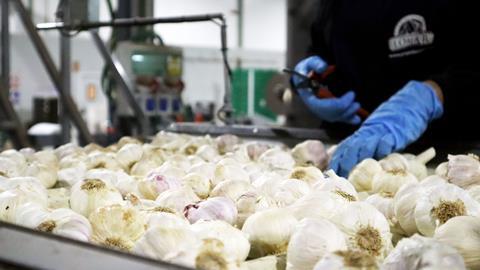Despite ongoing challenges, the La Mancha-based company anticipates strong growth in onion and garlic sales
Water restrictions, falling demand and climate change are just some of the challenges facing Spain’s onion and garlic industry according to leading producer Grupo Lomar.

The La Mancha-based company, which has been supplying garlic and onions for more than 50 years to its wholesale and supermarket customers throughout Spain, reported a turnover of €48.1mn last year –13 per cent down on the previous year’s record results, but 48.2 per cent above 2022 levels.
Onion production fell by 14.9 per cent compared to the previous year. “The average sales price has normalised, driven by an increase in supply at a national level that has exceeded demand. This has caused the average price to stand at €0.43/kg, lower than the peak reached in 2023 (€0.74/kg), but well above previous levels, which allows profitability to be maintained,” the company said.
In garlic, Grupo Lomar’s production grew 37.5 per cent compared to 2023, while average prices increased by 21.6 per cent to €3.32/kg. CEO José López de la Fuente said the upward trend in prices was due to higher production costs forcing many companies to plant less, resulting in a shortage of supply.
“Irrigation restrictions led us to cut back on sowing, which reduced production. This, together with high demand and the inflationary context, has driven up prices, especially for garlic,” he said, adding that this had also impacted consumption.
Despite the challenges it faces, the company said it expected the sector maintain a positive trend and for sales to increase in 2025. “We expect production and turnover to grow significantly. The price of onions will rise in the short term due to the increase in the costs of preserving the product, while garlic could experience a slight downward adjustment in the second half of the year with the new campaign,” López de la Fuente noted.
Nationally, the onion and garlic sector faces challenges such as increased production costs, difficulties in accessing water, price volatility and a lack of specialised labour. Despite these challenges, Grupo Lomar remains confident that the implementation of sustainable agricultural practices, technological innovation and the development of new, more resistant varieties can strengthen the sustainability and competitiveness of the sector in the future.
Grupo Lomar said a decision to concentrate all its production processes within a 60km radius of its headquarters in Zarza de Tajo, Cuenca, allowed it to generate a high-quality, local product, significantly reducing the costs and times of transporting the goods to the country’s main logistics centre, Mercamadrid, while also helping to cut carbon emissions.
“With a market in full evolution, the garlic and onion sector faces 2025 with expectations of recovery and growth, anticipating greater stability in production and maintaining competitive prices,” the company said.



